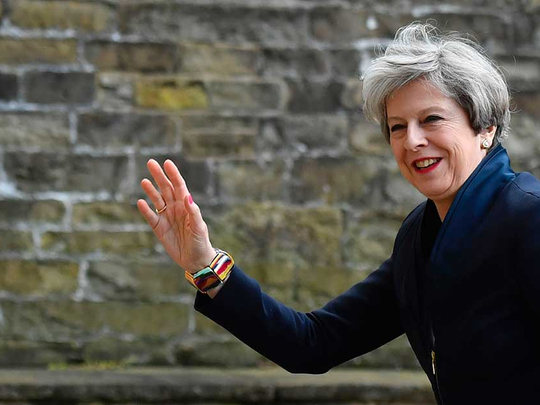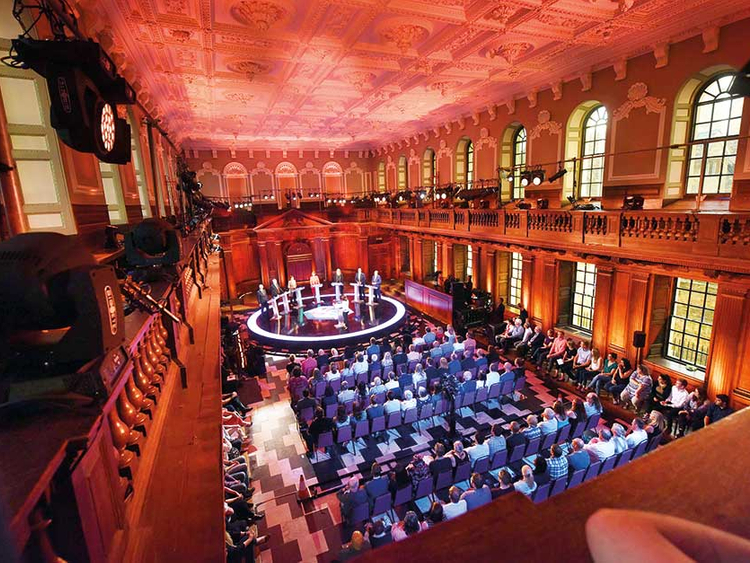
London: British Prime Minister Theresa May boycotted a prime time television debate Wednesday, just days before the June 8 general election, prompting accusations of a floundering campaign as polls slashed her ruling Conservative party’s lead.
The pound wobbled overnight after a shock projection forecast that May — who had been on course for a landslide just a few weeks ago — could actually lose her majority in the House of Commons after next week’s vote.
May’s decision to skip a televised election debate threatened to rebound on her as other party leaders lambasted her absence, saying it proved she’s unfit to lead Britain.
The prime minister’s place was taken at the BBC debate in the University City of Cambridge on Wednesday night by one of the most senior ministers in her Conservative government, Home Secretary Amber Rudd. She went through with the appearance even though her father died earlier this week, according to two Tory officials who asked not to be named as the information wasn’t public.
“The prime minister is not here tonight. She can’t be bothered,” Liberal Democrat leader Tim Farron told viewers at the end of the 90-minute debate. “You’re not worth Theresa May’s time. Don’t give her yours.”
May decided to stick to her decision not to take part even though Labour Party leader Jeremy Corbyn announced he would do so earlier Wednesday. His challenge to the prime minister followed a week during which May has seen her previously 20 percentage-point lead over Labour dwindle to as little as 4 points, with one projection by YouGov Plc suggesting the June 8 vote could lead to the Tories losing their majority in Parliament.
“Theresa May called this election because she is taking you for granted,” Leanne Wood, who heads the Welsh nationalist party Plaid Cymru, said in her opening statement. “She won’t turn up to these debates because her campaign of sound bites is falling apart.”
Others soon joined in, with the Scottish National Party’s leader in the UK. Parliament, Angus Robertson, dubbing May “not so much the iron lady as the U-turn queen.”
Rudd herself sometimes gave the impression of wishing to be somewhere else. “Thank you, Tim, for that pass,” she told Farron after his attack on her absent boss. At another point she turned to Robertson. “Don’t give up on me yet, Angus,” she said. “Theresa May may not be here, but I hope to make a good fist of setting out Tory policy.”
Then, in a slip that might hint that she has ambitions for the top job herself, she asked him: “Have you not read my manifesto?”
May’s absence was even mocked by the Netflix series “House of Cards,” about a fictional US president. In a tweet addressed to the prime minister, it said: “They respect you more when you show strength. Or show up.”
Corbyn himself did not directly attack the prime minister for her absence, choosing instead to address criticism of his own leadership style. That, he said, was about being able to listen and not being “high and mighty.”
May had earlier told a campaign rally that “debates where the politicians are squabbling among themselves doesn’t do anything for the process of electioneering”.
“It’s actually about getting out and about, meeting voters and hearing directly from voters,” the prime minister said.
The debate itself was a boisterous affair, covering Brexit, the economy, public services, climate change, immigration and security — a major issue after the Manchester attack last week.
Corbyn and Farron were joined by the leaders of the Green party, the UK Independence Party and Welsh nationalists Plaid Cymru and the deputy leader of the Scottish National Party.
In the televised debate, Rudd accused Corbyn of having drawn up a “fantasy wishlist” manifesto paid for with a magic “money tree”, and noting that most of his MPs backed a failed coup against him last year.
The Labour leader hit back by accusing the government of offering five more years of austerity “to fund tax handouts for the wealthy few”.
SNP deputy leader Angus Robertson mocked May’s claim to offer “strong and stable” leadership, saying: “Weak and wobbly is where we are.”













